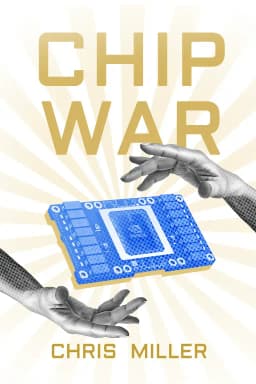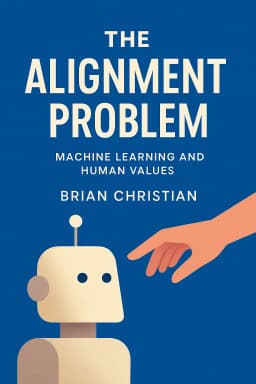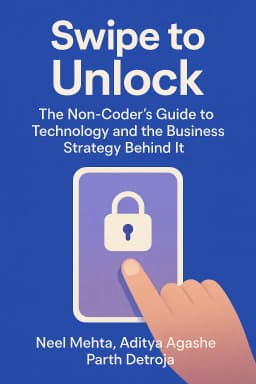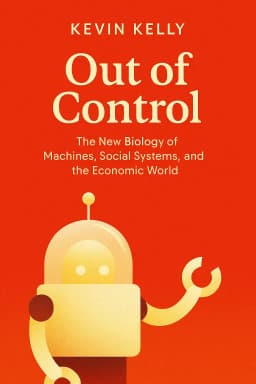
Personalized Podcast
Golden Hook & Introduction
SECTION
Nova: What if the most dangerous product we're currently designing… is our own obsolescence? We in the world of innovation talk about disruption, about changing the game. But what if the game we're changing is humanity itself? And what if we're on the verge of losing?
wangl: That’s a chilling thought, Nova. As a product manager, my world is all about intentional design for a better user experience. The idea that our collective "innovations" could be leading to a catastrophic system failure for humanity is… well, it's the ultimate design flaw.
Nova: Exactly. And that is the terrifying, central question posed by Bill McKibben’s book, Falter: Has the Human Game Begun to Play Itself Out? It’s a book that argues we’re at a precipice, facing two immense, game-ending threats. Today we'll dive deep into this from three perspectives. First, we'll explore the ideological virus of hyper-individualism that set the stage for our current crises.
wangl: The "operating system" behind the problem. I like that.
Nova: Precisely. Then, we'll confront the 'God-Tools'—AI and CRISPR—and the profound design ethics they demand.
wangl: Which is where it gets very real for anyone in technology and design.
Nova: And finally, we'll open up the 'Resistance Toolkit,' looking at the new hardware and social software that might just save the game. So, wangl, as someone who thinks deeply about technology, innovation, and mindset, I’m so glad you’re here to unpack this with us.
wangl: I’m ready. It feels like a conversation we absolutely need to be having.
Deep Dive into Core Topic 1: The Ideological Virus
SECTION
Nova: So, to understand how we got here, McKibben argues we have to look at the 'operating system' running in the background for the last 50 years. He points a finger, squarely, at the philosophy of Ayn Rand. For our listeners, Rand was a novelist and philosopher who championed a concept she called Objectivism. At its core, it’s a radical celebration of the individual, of selfishness as a virtue, and a deep, profound distrust of government or any form of collectivism.
wangl: It’s the ultimate "me-first" ideology. And it’s incredibly seductive, especially in America, which has always had that streak of rugged individualism.
Nova: Incredibly. And McKibben tells this amazing story to show how deeply this virus infected the highest levels of power. He talks about Alan Greenspan, who would later become the Chairman of the Federal Reserve—arguably the most powerful economist on the planet for decades. As a young man in the 1950s, Greenspan fell into Rand’s inner circle. He would go to her apartment on Saturday nights, and she would read chapters of her magnum opus, Atlas Shrugged, aloud to her acolytes. He was completely smitten.
wangl: Wow. So the man controlling the world’s economic levers was a disciple of this philosophy.
Nova: A true disciple. When the New York Times gave Atlas Shrugged a scathing review, Greenspan wrote a letter to the editor defending it, saying, "Parasites who persistently avoid either purpose or reason perish as they should." And when he was sworn in to chair the President's Council of Economic Advisers, Ayn Rand stood right there beside him. This wasn't a casual influence; it was foundational.
wangl: That’s fascinating, and it makes so much sense in the context of the tech world. The mythos of Silicon Valley is built around the heroic founder, the lone genius in a garage who changes the world. Think of Steve Jobs, or even the more controversial figures like Travis Kalanick, Uber's founder, who literally used the cover of Rand's book The Fountainhead as his Twitter avatar. This philosophy gives a kind of moral permission to "move fast and break things."
Nova: That's a perfect connection. And McKibben’s point is that this same philosophy gave moral permission to the fossil fuel industry to break the climate. If your only duty is to your shareholders and your own profit, and government is an evil to be thwarted, then hiding the truth about climate change, which Exxon and others did for decades, isn't just a business decision—it's a moral crusade.
wangl: So it’s the same ideological OS running two very different, but equally destructive, programs. One is actively dismantling the planet's physical systems, and the other is building technologies that could dismantle our social systems. But I have to ask, does that 'move fast and break things' mindset really work when the 'thing' you might break is the human genome? Or the very concept of human purpose?
Nova: And that's the perfect segue, wangl, because 'breaking things' takes on a whole new, terrifying meaning when we talk about McKibben's second major threat: the 'God-Tools' of AI and gene editing.
Deep Dive into Core Topic 2: The God-Tools
SECTION
Nova: McKibben argues that for all of human history, our nature has been a given. But now, with technologies like CRISPR, we're on the verge of being able to edit the human source code. He makes a crucial distinction between two types of gene editing. The first, somatic editing, is like a targeted drug. It fixes a problem in one person, like leukemia, and isn't passed on. It's a medical miracle. He tells the story of Emily Whitehead, a little girl who was the first child to receive this kind of therapy and was saved from near-certain death.
wangl: That’s the promise of technology we all dream of. It’s innovation in the service of humanity. It’s a clear, unmitigated good.
Nova: Exactly. But then there’s the other kind: germline editing. This is where you edit an embryo, and the changes are passed down through all future generations. This is where we get into what people call 'designer babies.' And McKibben gives us a chilling, real-world example. In 2018, a Chinese scientist named He Jiankui announced he had created the world’s first CRISPR-edited babies, twin girls. His goal was to make them resistant to HIV.
wangl: But… there are already simple, effective ways to prevent HIV transmission from parent to child. There was no medical necessity for that. It was a solution in search of a problem, which is a classic product design anti-pattern.
Nova: You've hit the nail on the head. The global scientific community was horrified. It was reckless, unnecessary, and opened a Pandora's Box. Jennifer Doudna, one of the inventors of CRISPR, even recounts having a recurring nightmare where Adolf Hitler, with a pig's face, comes to her asking about the technology. That's the level of anxiety we're talking about from the very person who created it.
wangl: From a design and ethics perspective, what He Jiankui did is the ultimate failure of user-centered design. He never asked his 'users'—the twins, or any of us in future generations—for consent. It's a horrifying violation of the most basic design principle: do no harm. It treats human beings as a spec sheet to be optimized, not as people with agency and inherent worth. It’s the difference between healing a person and redesigning the species without a product brief or a single stakeholder interview.
Nova: And what happens when that 'redesign' is driven by the market? McKibben quotes a bioethicist who asks, "Would it be so terrible to allow parents to at least aim for a certain type, in the same way that great breeders… try to match a breed of dog to the needs of a family?"
wangl: That’s terrifying. Because it inevitably leads to a genetic arms race. If your neighbor can pay to give their child 30 extra IQ points, the pressure on you to do the same becomes immense. It’s no longer a choice; it’s a coercive market. It would create a biological caste system, entrenching inequality not just in our bank accounts, but in our very DNA. That’s a future no one should be designing.
Nova: It’s a bleak picture. And it feels overwhelming. But McKibben doesn't leave us in despair. He argues that if a flawed ideology is the virus, and these God-Tools are the potential symptoms, we need new 'software' to fight back. This brings us to the Resistance Toolkit.
Deep Dive into Core Topic 3: The Resistance Toolkit
SECTION
Nova: McKibben proposes two key "technologies" to help us navigate this future. The first is hardware: the solar panel. He argues that unlike oil or gas, which is concentrated in a few places and creates oligarchs, the sun is diffuse. It shines everywhere. This decentralizes power, both literally and politically. He tells these beautiful stories of visiting villages in Ghana and Tanzania where a single solar panel transforms lives, providing light for kids to study and power for a clinic to store vaccines. It’s small-scale, human-centric technology.
wangl: It’s distributed power. It’s an open-source energy system. That’s a powerful design principle. Instead of a centralized, top-down system controlled by a few, you have a network where every node can be a producer. It builds resilience.
Nova: Exactly. And the second technology he champions is "social software": nonviolent mass movements. He looks back at Thoreau, who went to jail for a night for refusing to pay a tax that supported slavery. It seemed like a small, futile act. But his essay on that experience, "Civil Disobedience," became the blueprint for Gandhi, for Martin Luther King Jr., for the activists who fought apartheid.
wangl: And for figures like Rosa Parks, who I admire so much. Her refusal to give up her seat wasn't just a moment of personal frustration; it was a planned, strategic act of nonviolent resistance. It was a point of leverage.
Nova: That's the key. McKibben argues that these movements are a technology for social change. He co-founded the group 350.org, which started a campaign to get universities and institutions to divest from fossil fuels. At first, everyone said it was pointless. But seven years later, portfolios worth nearly 8 trillion dollars had divested. Shell Oil now lists the divestment movement as a "material risk" to its business.
wangl: That’s incredible. It reframes activism as a form of social design or social innovation. It's about redesigning power dynamics. It's not just protest; it's a strategic intervention in a system, much like a well-designed product can disrupt an entire market. It gives agency back to the 'users' of a society, allowing them to rewrite the rules of the game. It’s the ultimate user revolt.
Nova: A user revolt! I love that. It’s the active many overcoming the ruthless few. And it proves that the argument "it's inevitable" is just an excuse for inaction.
Synthesis & Takeaways
SECTION
Nova: So, we’ve traced this incredible arc from the book. We started with a flawed ideological operating system—radical individualism—that fueled both the climate crisis and the unchecked ambition behind our most dangerous new technologies.
wangl: And we saw how those technologies, the 'God-Tools' of CRISPR and AI, present us with the most profound design challenge in human history: how to innovate without losing our humanity.
Nova: But we ended with hope. With a new toolkit for resistance, based on decentralized hardware like solar panels and powerful social software like nonviolent movements.
wangl: It’s a call to be better designers of our future. To be more intentional.
Nova: So, wangl, as we close, what’s the one big takeaway for you? The one question or idea from Falter that will stick with you?
wangl: For me, as someone who works in tech and design, the question McKibben leaves us with is profound. He talks about the need for 'maturity,' 'balance,' and 'scale.' These aren't words you hear in Silicon Valley, which is obsessed with 'growth,' 'disruption,' and 'scale' in a very different sense. So the question is, how do we, as creators and innovators, champion these more mature values? How do we design for connection, not isolation? For resilience, not just efficiency? For meaning, not just utility? I think the most important feature we can build into our future is a deep, abiding respect for the human game itself.
Nova: A powerful and perfect place to end. Thank you so much, wangl.
wangl: Thank you, Nova. This was essential.









